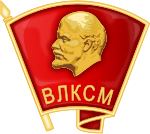Leninist Communist Youth League
|
All-Union Leninist Young Communist League Всесоюзный ленинский коммунистический союз молодёжи |
|
|---|---|
 |
|
| Founded | October 29, 1918 |
| Dissolved | September 1991 |
| Ideology |
Communism, Marxism-Leninism |
| Mother party | Communist Party of the Soviet Union |
| International affiliation | World Federation of Democratic Youth |
| Newspaper | Komsomolskaya Pravda |
The All-Union Leninist Young Communist League (Russian: Всесою́зный ле́нинский коммунисти́ческий сою́з молодёжи (ВЛКСМ) ![]() listen ), usually known as Komsomol (Russian: Комсомо́л, a syllabic abbreviation of the Russian kommunisticheskiy soyuz molodyozhi), was a political youth organization in the Soviet Union. It is sometimes described as the youth division of the Communist Party of the Soviet Union (CPSU), although it was officially independent and referred to as "the helper and the reserve of the CPSU".
listen ), usually known as Komsomol (Russian: Комсомо́л, a syllabic abbreviation of the Russian kommunisticheskiy soyuz molodyozhi), was a political youth organization in the Soviet Union. It is sometimes described as the youth division of the Communist Party of the Soviet Union (CPSU), although it was officially independent and referred to as "the helper and the reserve of the CPSU".
The Komsomol in its earliest form was established in urban centers in 1918. During the early years, it was a Russian organization, known as the Russian Young Communist League, or RKSM. During 1922, with the unification of the USSR, it was reformed into an all-union agency, the youth division of the All-Union Communist Party.
It was the final stage of three youth organizations with members up to age 28, graduated at 14 from the Young Pioneers, and at nine from the Little Octobrists.
Before the February Revolution of 1917 the Bolsheviks did not display any interest in establishing or maintaining a youth division, but the policy emphasis shifted in the following months. After the Russian Civil War of 1917-1922 ended, the Soviet government under Lenin introduced a semi-capitalist economic policy to stabilize Russia’s floundering economy. This reform, the New Economic Policy (NEP), introduced a new social policy of moderation and discipline, especially regarding Soviet youth. Lenin himself stressed the importance of political education of young Soviet citizens in building a new society.
...
Wikipedia
